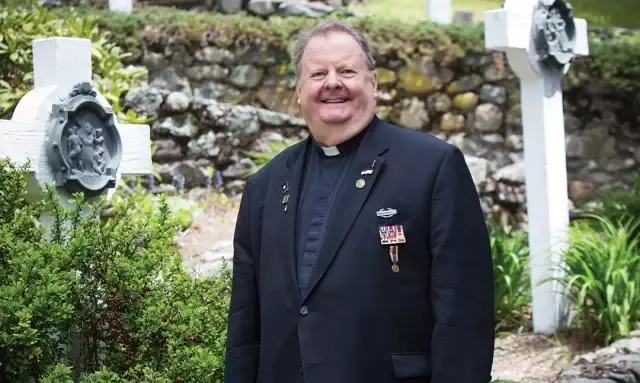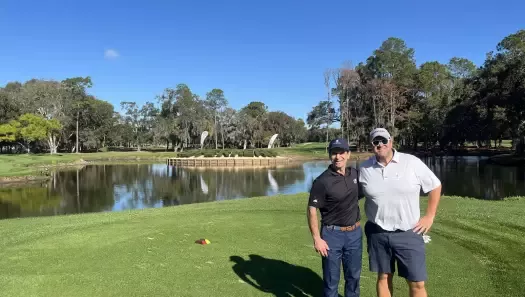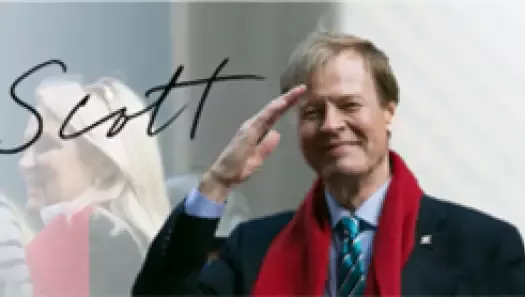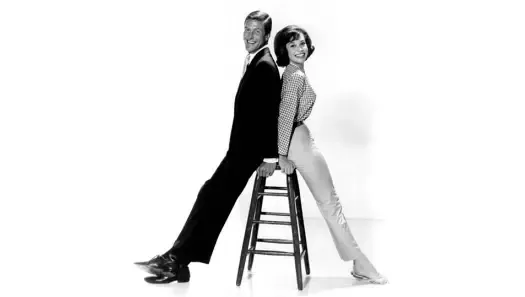HeroVet Father Phil Salois Priest with a Silver Star Ministers To Those Who Have Seen the Blood

Father Phil Salois is a son of Woonsocket, Rhode Island. He graduated from high school in 1966, went to college in California. After a year, he dropped out and was building his career at an insurance company in Los Angeles when he was drafted to serve in Vietnam.
He was trained as an infantryman; his MOS was 11Bravo. With the war in Southeast Asia raging, Phil Salois didn’t have any illusions as to where 11 Bravos were being sent.
In September 1969, six months after entering the service, he was shipped to Vietnam. He was assigned to the 199th Light Infantry Brigade – “we were separate and light,” he smiles – operating in the southwest of Saigon.
In his first months there, he saw his “fair share” of combat. His unit spent a lot of time trudging along the dikes of rice paddies, looking for an elusive enemy who chose when and where to encounter his American adversaries. Along the dikes there was little cover. We were feeling, Phil Salois says, “very insecure.”
For the most part, this time in country was uneventful. One day, another grunt at the front end of a long column stepped on a booby trap, a “bouncing Betty" and was killed instantly. The guy behind him lost both legs.
So went the ebb and flow of the quiet war in III Corps.
Then the 199th was sent to Xuan Loc in War Zone D in III Corps, where the embrace of the triple canopy jungle offered false security, a polar opposite to the wide-open rice paddies. That the jungle was not a friend was never more evident than on 1 March 1970.
Into the Mystic
“We were on a search-and-destroy mission, looking for the 133rd NVA Battalion,” says Father Phil, as he is known far and wide. “On February 28, we found an elaborate bunker complex near Xuan Loc, about 65 miles northeast of Saigon.”
With daylight growing short, the two platoons of the 199th pulled back a couple of kilometers into a night defensive perimeter. Despite their fears of an attack by the enemy, they spent a quiet night. Too quiet. The next day, the CO “ordered us to go down the same trail back to the bunker complex,” Father Phil says. “He was brand new; this was his first time in the field. And we walked right into a U-shaped ambush.”
The front element of the platoon was cut off. “As we formed a defensive line and returned fire, we lost contact with them.”
For Phil Salois, “time stood still.”
A volunteer was needed to go after the men in the front element. Phil volunteered. As he set out, he made a promise to God: "God, if you get me out of this place safe and sound without a scratch, I will do anything you want.”
Armed with an M-79 grenade launcher, he and a buddy took off. In the chaos and confusion of the next few moments, they took cover behind a large boulder, sprayed their right flank with small-arms fire – this was a diversionary tactic – then sprinted to where their comrades were pinned down.
As they and four of the men made a run back toward the relative safety of their line, Phil’s buddy was shot in the head. It was Phil who went back, under fire, to retrieve the body. He went out a third time for the other two guys, one of whom, a lieutenant, had been killed.
The night that followed “was the scariest night of my life,” Father Phil says. “We thought they’d come back and finish us off. Instead, they vanished into the jungle.”
Of 27 men in his platoon, seven escaped unscathed. Two had been killed, 12 wounded. Phil Salois was one of the uninjured. For his actions, he was awarded the Silver Star. His dead buddy was honored with the Distinguished Service Cross. The newbie captain was taken out of the field, where he never should have been anyway: he had been trained in logistics, not combat command.
Bond of Brothers
“I don’t remember much of what happened after that,” Phil Salois says. “I must have numbed out. I have very little recall.” The 199th exited Vietnam the day before he did. After 19 months in the military, Phil was given an early out. Along with his memories of combat are recollections of camaraderie.
“I don’t think I ever felt as close to another human being as I did with my buddies over there,” he says. “You learn to rely on others for your life. And you form a bond that’s closer than blood brothers.”
This bond didn’t break as men left the military and returned to their homes. Most married and had children. They pursued education, went to work, and became productive members of society. Despite the media-fueled stereotype of the lost-soul veteran victimized by his time in the combat zone, most were able to put their war experiences in a place that didn’t dominate their days.
They became credits, not burdens, to their communities.
As a newly minted veteran, Father Phil first went back to work for the insurance company he’d been at when he got drafted. In 1972, he felt the call to the priesthood. It wasn’t until two years into his studies that he remembered the promise he had made to God on the first of March, 1970. It was a “nice fall day in Camarillo, California,” he says, “and I heard a voice. ‘ Do you remember that promise you made to me four years ago?’ I did.”
But he left the seminary, then returned in 1977 to finish his studies. He is now a member of the Missionaries of Our Lady of La Salette who found his niche in the priesthood. “I came from a very faith-filled family,” he says. “I brought my faith with me to Vietnam. There it got deeper. I knew if any entity could get me out okay, it would be by the grace of God.”
When he returned to New England, to Attleboro, Massachusetts, he felt the need to join a veterans group, to be with people of a “common background.” But men and women gravitated to him for counseling, and before he knew it, “I was not their buddy; I’d become their priest,” he says.
Since 1989 he has been a resident cleric at the Boston VA Healthcare System; he is now chief of chaplain services there. He is the spiritual advisor for Vietnam Veterans of America. He is president of the National Conference of Viet Nam Veteran Ministers. He has used his experiences to help those who served come to terms with their lives and their faith, often through interdenominational weekend retreats for troubled veterans and their spouses.
“I deal with veterans every day who blame God for the destruction they witnessed, who want God to take the rap for what happened,” he says. “As they retire, a lot of guys have a lot of time on their hands. Their jobs gave them their identity, and with nothing to fall back on, they tend to dwell on the past. We work with them to bring them to a more mature understanding of God, to embrace a renewed sense of God.”
Father Phil works to instill what he calls a “re-founding” in veterans. Each vet, he believes, “has a story unique unto himself. Often his experiences are very painful. We work with him to ‘re-found,’ or reconnect with his past by putting his story into a new context that can serve a useful purpose and bring meaning back into his life.”
Father Phil has found his calling. And veterans in need of spiritual solace have found a champion.
Image Credit: https://www.legion.org/magazine/236274/lifetime-healing



